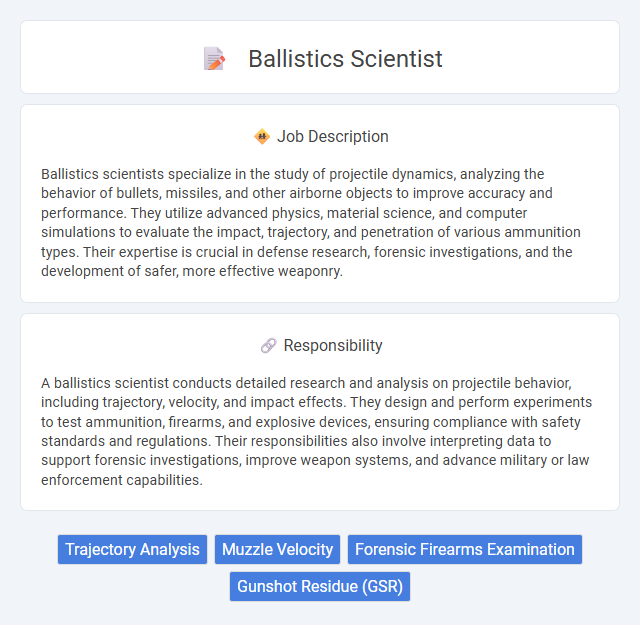
Ballistics scientists specialize in the study of projectile dynamics, analyzing the behavior of bullets, missiles, and other airborne objects to improve accuracy and performance. They utilize advanced physics, material science, and computer simulations to evaluate the impact, trajectory, and penetration of various ammunition types. Their expertise is crucial in defense research, forensic investigations, and the development of safer, more effective weaponry.
Individuals with strong analytical skills and a keen interest in physics may find a career as a ballistics scientist suitable. The role often involves rigorous testing and research, which could be demanding for those who prefer less detail-oriented or physically intensive work environments. People comfortable with complex problem-solving and working under pressure are more likely to succeed in this field.
Qualification
A ballistics scientist typically requires a strong foundation in physics, engineering, or materials science, often holding at least a bachelor's degree in these fields, with many positions favoring a master's or doctorate for advanced research roles. Proficiency in computational modeling, data analysis, and experimental methods is crucial, alongside experience with firearms, explosives, and projectile dynamics. Certifications in forensic analysis or military technology, combined with practical laboratory skills and knowledge of safety regulations, enhance a candidate's qualifications.
Responsibility
A ballistics scientist conducts detailed research and analysis on projectile behavior, including trajectory, velocity, and impact effects. They design and perform experiments to test ammunition, firearms, and explosive devices, ensuring compliance with safety standards and regulations. Their responsibilities also involve interpreting data to support forensic investigations, improve weapon systems, and advance military or law enforcement capabilities.
Benefit
A career as a ballistics scientist likely offers significant financial benefits due to the specialized expertise required in analyzing projectile behavior and impact. Opportunities in defense, aerospace, and forensic industries may provide job stability and access to cutting-edge technology. The role potentially comes with benefits such as research funding, collaborative projects, and career advancement in high-demand scientific fields.
Challenge
Ballistics scientists likely face complex challenges analyzing projectile behavior under varying conditions, requiring precise calculations and experimentation. They probably encounter difficulties optimizing weapon designs for accuracy and safety while adhering to strict regulatory standards. Solving these issues involves continuous innovation and adapting to technological advancements in the field.
Career Advancement
Ballistics scientists advance their careers by gaining expertise in exterior, interior, and terminal ballistics, often progressing to senior research or project management roles within defense, aerospace, or forensic organizations. Specializing in computational modeling and experimental testing enhances opportunities for leadership positions in weapon systems development or forensic ballistic analysis. Continuous education, such as advanced degrees in physics or engineering, and publishing research in reputable journals significantly bolster career growth and industry recognition.
Key Terms
Trajectory Analysis
Ballistics scientists specialize in trajectory analysis by applying physics and mathematics to predict the flight paths of projectiles. They utilize advanced computer modeling and simulation tools to evaluate factors such as velocity, drag, gravity, and environmental conditions affecting projectile motion. Accurate trajectory analysis supports fields like defense, forensic investigation, and aerospace engineering to improve weapon design and impact prediction.
Muzzle Velocity
A ballistics scientist specializes in analyzing projectile motion and the factors influencing muzzle velocity, a critical parameter in assessing firearm performance and accuracy. Precise measurement and optimization of muzzle velocity enable enhanced ballistic efficiency, reduced recoil, and improved projectile stability. Utilizing advanced simulation techniques and empirical testing, ballistics scientists contribute to innovations in ammunition design and weapon systems development.
Forensic Firearms Examination
A ballistics scientist specializing in forensic firearms examination analyzes firearm-related evidence to assist criminal investigations. They use advanced techniques to compare bullet trajectories, cartridge casings, and gunshot residues to determine the origin and use of weapons. Expertise in ballistics imaging systems and database management enhances accuracy in matching firearms to crime scenes.
Gunshot Residue (GSR)
A ballistics scientist specializing in Gunshot Residue (GSR) analyzes microscopic particles deposited on a shooter's hands, clothing, or nearby surfaces to determine firearm discharge events. Utilizing advanced techniques such as Scanning Electron Microscopy (SEM) with Energy Dispersive X-ray Spectroscopy (EDS), they identify characteristic elements like lead, barium, and antimony to confirm GSR presence. Their expertise supports criminal investigations by providing crucial forensic evidence that links suspects to firearm use and reconstructs shooting incidents.
 kuljobs.com
kuljobs.com